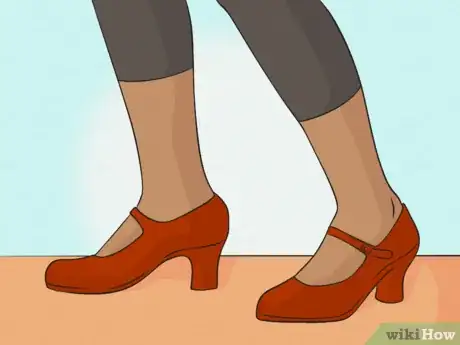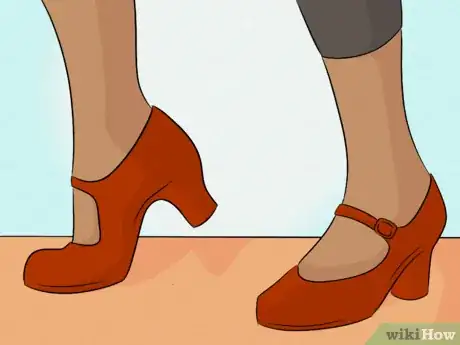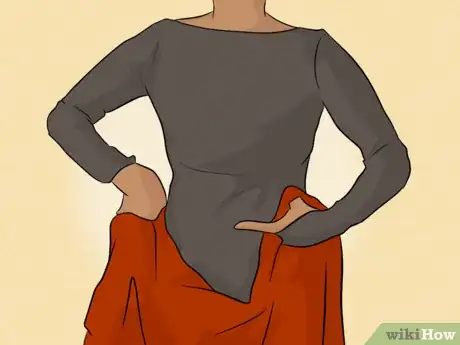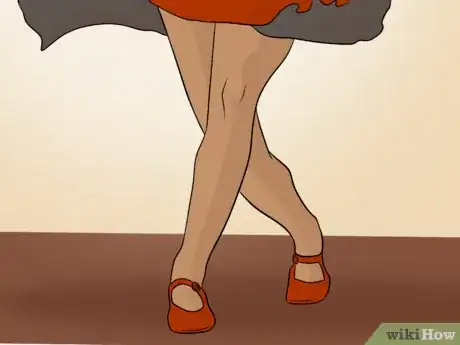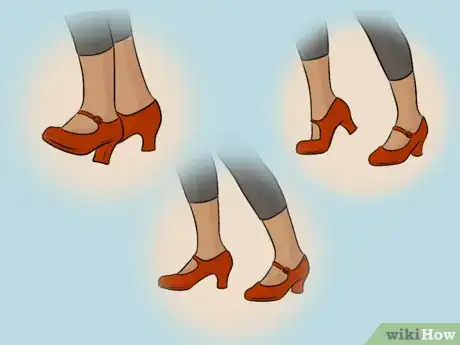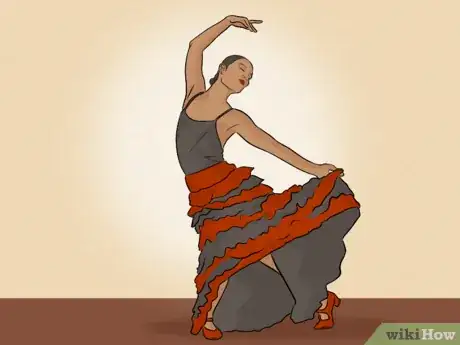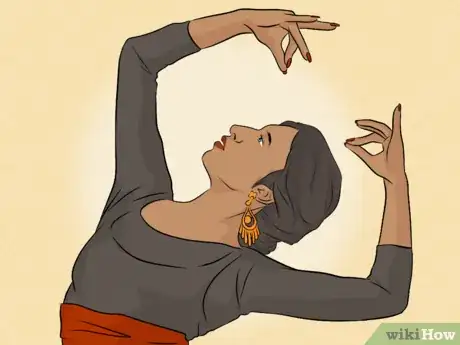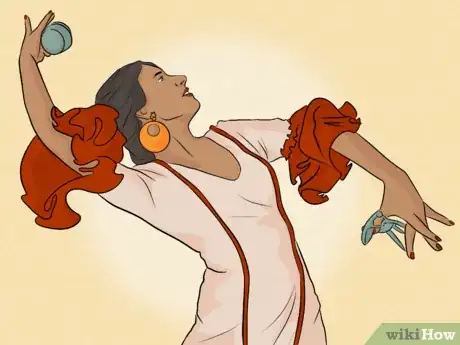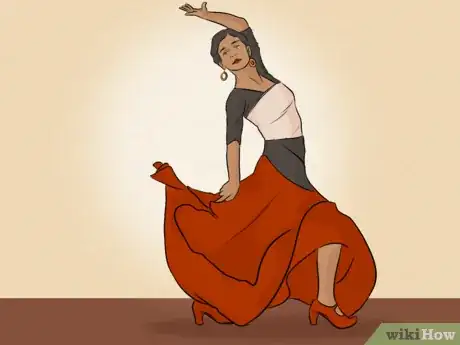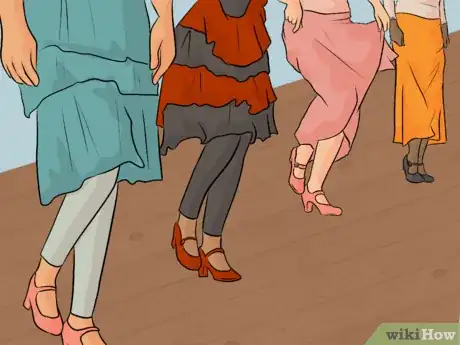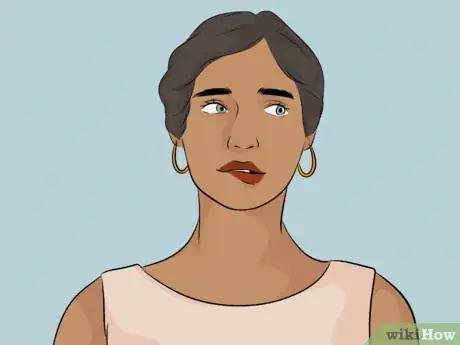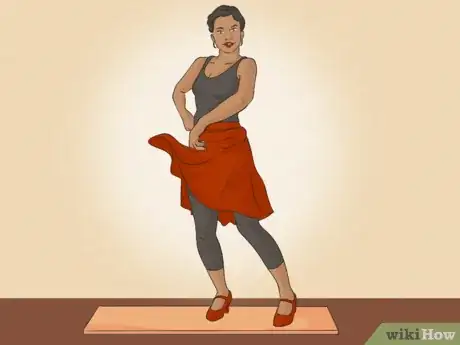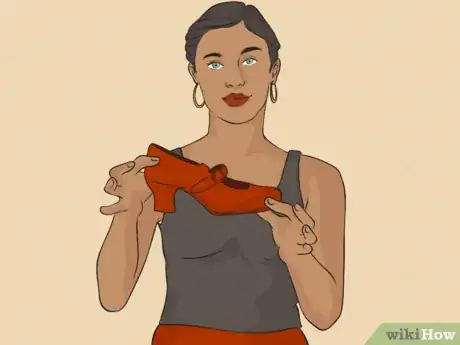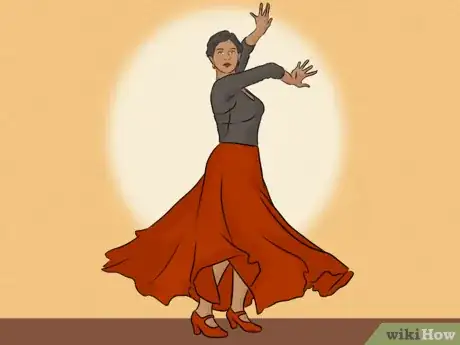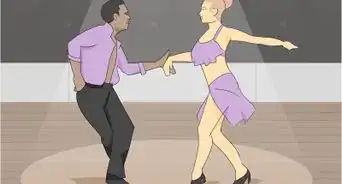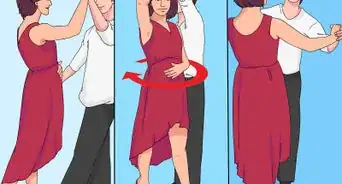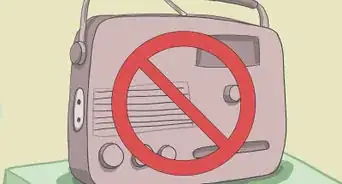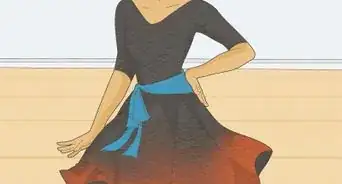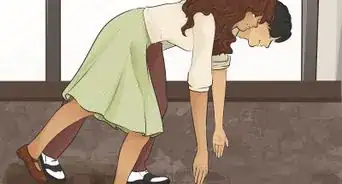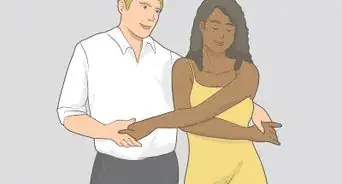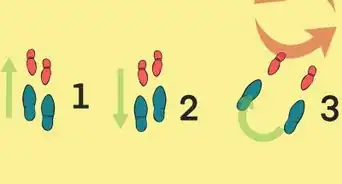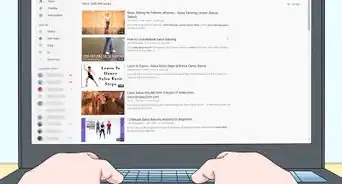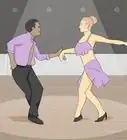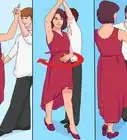This article was co-authored by Leela Fazzuoli & Daniele Cavallo. Daniele Cavallo and Leela Fazzuoli are Professional Latin Dance Instructors and the Co-Founders of Cavallo Dance AZ, a dance studio based in Phoenix, Arizona. With more than 20 years of experience each, they specialize in Latin dances, dance performances, and competition dance. They have expertise in Salsa and Bachata, Argentine Tango, Cha Cha, Samba, Rumba, Paso Doble, and Jive.
This article has been viewed 68,295 times.
Flamenco is a traditional Spanish Romani dance that requires both poise and elegance. While it is improvisational, you may also develop routines. Whether you’re male or female, learn the basic stamp and tap and immerse yourself in Flamenco.
Steps
Stamp and Tap
-
1Stamp correctly. The stamp is known as a flat. Quickly bring your foot down to make contact with floor. You want to create a single loud stamp as your heel and toe land at the same time.[1]
-
2Tap correctly. Plant either your toe or heel down create a sound as it makes contact with the floor. Keep contact with the floor and don’t lift it again. Beginners usually should tap with their toe first.[2]
- The basic foot tap is toe-heel, not the other way around.
Advertisement -
3Keep your weight firmly over your hips. You want to generate the appropriate amount of contact to be able to differentiate between the stamp and tap. Put the whole ball of your foot down when tapping your toe.[3]
-
4Keep soft knees. Do not lock your knees or straighten your legs when producing the stamp or tap. This will injure your lower back, knees, and legs. You want to be simultaneously fluid and rigid when you make the quick strike to produce the distinct sounds of the stamp and tap.[4]
-
5Try a beginners flamenco step. First practice these steps with your dominant foot, then practice with your other foot once you’ve mastered the movements with your first foot. You should be creating five sounds with this sequence.[5]
- Toe: Tap your toe down and let it stay on the ground.
- Heel: Tap your heel down.
- Heel: Tap down your heel again and keep it on the floor.
- Toe: Tap your toe down and let it stay there. It should have remained touching the floor as you performed your heel taps.
- Flat: Your entire foot should be touch the floor. Raise it and perform a flat, or stamp.
- The entire sequence then is Toe - heel - heel - toe - flat. Practice until you have perfected it.
Additional Moves
-
1Add slow and beautiful hand and arm movements. Many rhythms and footwork are combined to create a beautiful dance.[6] Your movements will be in time with the music but usually involve fluid, wide circles. Your movements should be in time with the rhythm of the music as well as your steps.[7]
- Braceo (bra-SAY-oh) is when you position your arms so that they move from one position to another to create a continuous fluid movement. You want the movement to originate between your shoulder blades, and to flow from the center of your back.
- Picos are rhythmic finger snaps that you can add both to keep time and have dramatic affect.
-
2Add head movement. The positioning of your head will depend on the music and the routine you devise. Your routine will be based on tempo, steps, and turns.[8]
- You may flip your head to the rhythm of the music.
-
3Add Pellizco. Pellizco is a pinch of your own flavour. It’s a spontaneous gesture or fun movement to heighten the effect of your movement. It can be humourous or flirtatious and can be done with the flip of your head, shimmy of your shoulders, or the look in your eye.
-
4Understand that it is improvisational. Allow the music to dictate your dance as your improvise your movements. The dance should be loud, exciting, fiery and even sensual. The movements should evoke a romantic atmosphere.[9]
Flamenco Tips
-
1Take a class. While the dance is improvisational, you may learn proper techniques and routine from a class. You may also learn about the history and tradition of the music and songs related to the ancient dance.[10]
- Having a good teacher can help you develop a routine that suits your coordination and skill level.
-
2
-
3Wear proper clothing. Beginners should wear tops that do not restrict their arms. Trousers should not be too long because you want your stamp and taps to sound clean. You don’t want cloth impeding the sound.[13]
-
4Wear proper footwear. Avoid wearing sneakers as you want to be able to generate a sound as you tap and stamp. The noise is a large part of the dance so be aware of what footwear can generate the cleanest sound while still keeping your comfortable and mobile. Wear shoes with solid soles. Rubber won’t generate a clear enough sound.[14]
- You want to generate a distinctive tap and stamp noise. Invest in proper Character Shoes if you want to pursue this dance further. They can be purchased online or your local dance shoe provider. They resemble tap shoes with metal plates at the toe and heel.
-
5Be patient. Whether you’re a beginner learning on your own or have a teacher, be patient as you progress in the dance. If you have a teacher, ask her to slow down and simplify steps that you are having difficulty with. If you are learning on your own, master the basics before moving onto full routines.[15]
- You may find Flamenco dance classes and teachers online or at your local dance studio. You can learn Sigiriya, a Flamenco dance done in social gatherings.[16] Find something that suits your schedule and skill level. The dance is colourful and passionate so be prepared to encounter big personalities and fun lessons.
Expert Q&A
-
QuestionIs the Flamenco dance hard to learn?
 Leela Fazzuoli & Daniele CavalloDaniele Cavallo and Leela Fazzuoli are Professional Latin Dance Instructors and the Co-Founders of Cavallo Dance AZ, a dance studio based in Phoenix, Arizona. With more than 20 years of experience each, they specialize in Latin dances, dance performances, and competition dance. They have expertise in Salsa and Bachata, Argentine Tango, Cha Cha, Samba, Rumba, Paso Doble, and Jive.
Leela Fazzuoli & Daniele CavalloDaniele Cavallo and Leela Fazzuoli are Professional Latin Dance Instructors and the Co-Founders of Cavallo Dance AZ, a dance studio based in Phoenix, Arizona. With more than 20 years of experience each, they specialize in Latin dances, dance performances, and competition dance. They have expertise in Salsa and Bachata, Argentine Tango, Cha Cha, Samba, Rumba, Paso Doble, and Jive.
Professional Latin Dance Instructors It depends—many rhythms and footwork require hours of practice, and most of it isn't used for social dance purposes. Still, the Siguiriyas is a type of Flamenco dance that is meant for social outings, and is a good starting point for anyone interested in learning.
It depends—many rhythms and footwork require hours of practice, and most of it isn't used for social dance purposes. Still, the Siguiriyas is a type of Flamenco dance that is meant for social outings, and is a good starting point for anyone interested in learning. -
QuestionCan I learn flamenco without going to a dancing class?
 Community AnswerYes, there are online tutorial videos that can teach you. Record yourself dancing to see how you compare, and work on any problem areas.
Community AnswerYes, there are online tutorial videos that can teach you. Record yourself dancing to see how you compare, and work on any problem areas. -
QuestionHow hard is it to dance the flamenco?
 Community AnswerYou can start off with the basics, which are easy, but the more you progress, the harder the steps will be.
Community AnswerYou can start off with the basics, which are easy, but the more you progress, the harder the steps will be.
Warnings
- Remember to warm up if you are not very active. You don’t want to injure yourself if you get carried away and over active.⧼thumbs_response⧽
References
- ↑ http://www.danceclass.com/flamenco-dance-steps.html
- ↑ http://www.danceclass.com/flamenco-dance-steps.html
- ↑ http://www.danceclass.com/flamenco-dance-steps.html
- ↑ http://www.danceclass.com/flamenco-dance-steps.html
- ↑ http://www.danceclass.com/flamenco-dance-steps.html
- ↑ Leela Fazzuoli & Daniele Cavallo. Professional Latin Dance Instructors. Expert Interview. 7 October 2021.
- ↑ http://www.danceclass.com/flamenco-dance-steps.html
- ↑ http://www.danceclass.com/flamenco-dance-steps.html
- ↑ http://www.danceclass.com/flamenco-dance.html
- ↑ http://www.danceclass.com/flamenco-dance.html
- ↑ Leela Fazzuoli & Daniele Cavallo. Professional Latin Dance Instructors. Expert Interview. 7 October 2021.
- ↑ http://www.danceclass.com/flamenco-dance.html
- ↑ http://www.danceclass.com/flamenco-dance.html
- ↑ http://www.danceclass.com/flamenco-dance.html
- ↑ http://www.danceclass.com/flamenco-dance.html
- ↑ Leela Fazzuoli & Daniele Cavallo. Professional Latin Dance Instructors. Expert Interview. 7 October 2021.
About This Article
If you want to dance Flamenco, understand that the dance is improvisational so you should perform the steps in time with the music in any way you like. To learn the basic steps, bring your foot down flat to create a loud stamp, which is known as a flat. You can also tap by bringing your toe or heel down on the floor and holding it in place. As you dance, move your hands and arms in wide circles in time with the music. Additionally, keep your weight over your hips so you generate enough power in your flats and taps, and bend your knees slightly to avoid injuring your back. For tips on how to sign up for a Flamenco class, read on!
